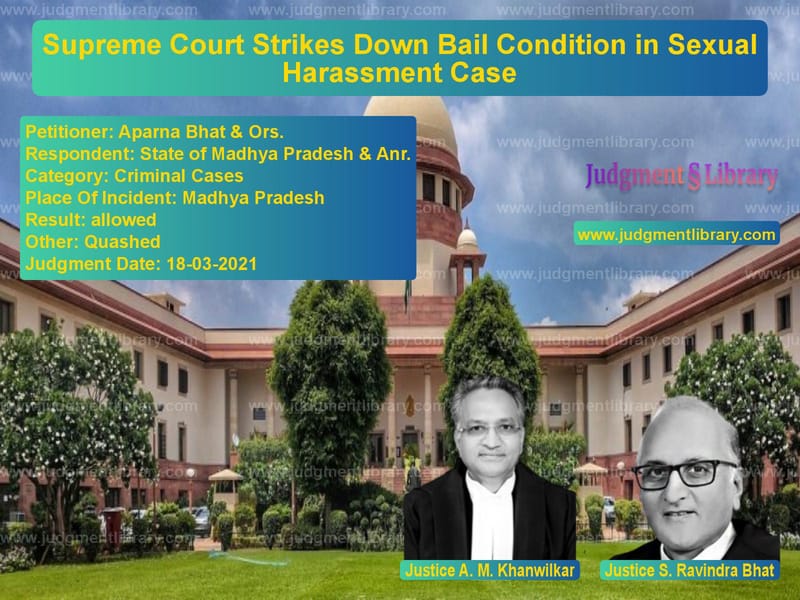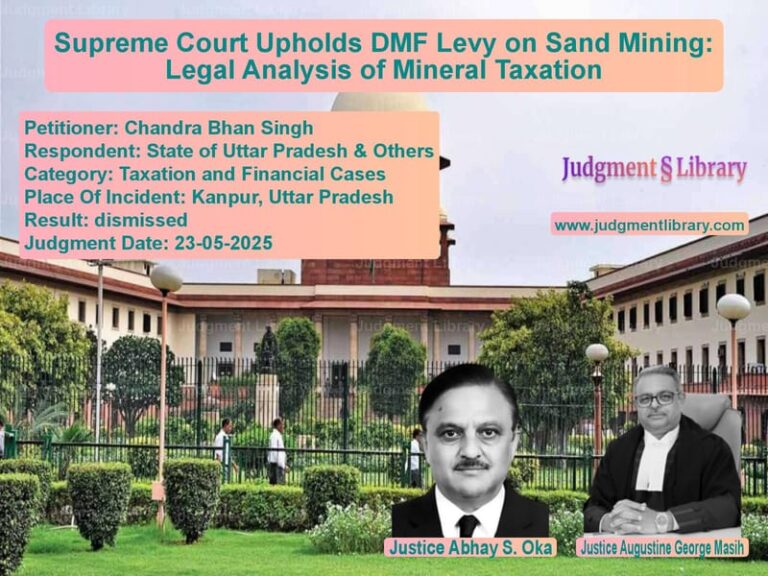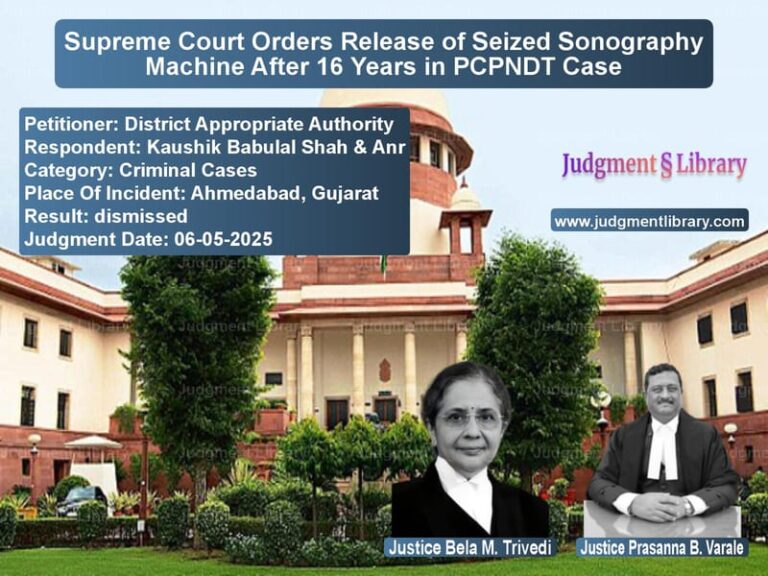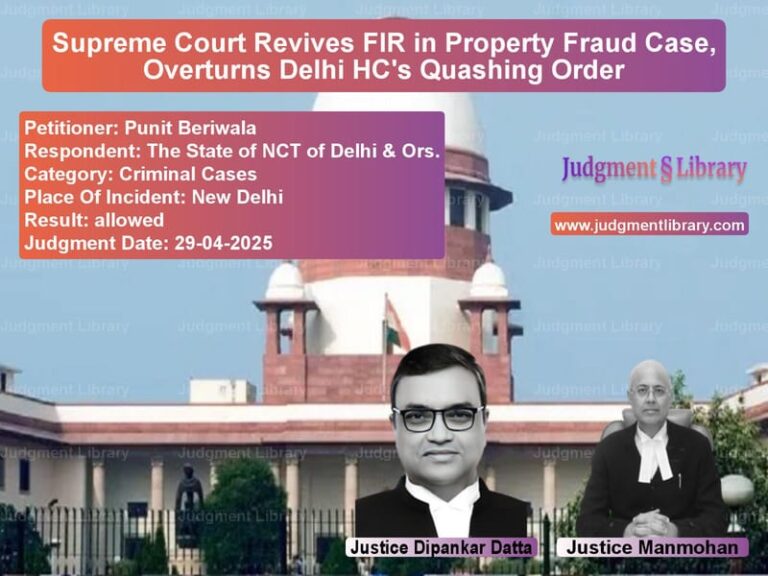Supreme Court Strikes Down Bail Condition in Sexual Harassment Case
The Supreme Court of India, in the case of Aparna Bhat & Ors. v. State of Madhya Pradesh & Anr., delivered a landmark judgment reinforcing the principles of gender sensitivity in judicial orders. The ruling came in response to an appeal challenging the Madhya Pradesh High Court’s decision, which imposed an unusual bail condition on an accused in a sexual harassment case. The condition required the accused to visit the complainant’s house on the festival of Raksha Bandhan and request her to tie a rakhi on his wrist as a gesture of ‘brotherly’ commitment to protect her.
Background of the Case
The case arose from an incident on April 20, 2020, in which the accused allegedly entered the complainant’s house and attempted to sexually harass her. Based on the complaint, an FIR was lodged under Sections 452, 354A, 323, and 506 of the Indian Penal Code (IPC). The accused applied for bail under Section 438 of the Code of Criminal Procedure (CrPC), which the High Court granted on July 30, 2020, with the controversial condition requiring the accused to visit the complainant’s home with sweets and request her to tie a rakhi.
Petitioners’ Arguments (Aparna Bhat & Ors.)
The appellants, public-spirited individuals and women’s rights activists, argued that:
- The bail condition trivialized the trauma of the survivor by treating a sexual offence as a family dispute.
- Requiring the accused to visit the complainant’s house violated her right to dignity and security.
- The condition failed to recognize the seriousness of sexual offences and reinforced patriarchal stereotypes.
- The High Court’s order set a dangerous precedent by normalizing compromises in sexual offence cases.
Respondents’ Arguments (State of Madhya Pradesh)
The State argued:
- The High Court had discretion under Section 437(3) and Section 438(2) of the CrPC to impose conditions in the interest of justice.
- The bail condition was intended to foster harmony between the parties.
- The accused had voluntarily agreed to comply with the condition, showing his remorse.
- The bail conditions did not prejudice the complainant as they did not interfere with the pending trial.
Supreme Court’s Observations
A two-judge bench comprising Justices A. M. Khanwilkar and S. Ravindra Bhat examined the legality of the High Court’s bail condition. The Court made several critical observations:
1. Gender Sensitivity in Judicial Decisions
“The use of reasoning/language which diminishes the offence and tends to trivialize the survivor, is especially to be avoided under all circumstances.”
The Court held that judicial orders should not reinforce gender stereotypes or suggest compromises that undermine the dignity of survivors.
2. Inappropriate Bail Conditions
“Granting bail, subject to such conditions, renders the court susceptible to the charge of re-negotiating and mediating justice between confronting parties in a criminal offence.”
The Court emphasized that bail conditions should not mandate or even permit contact between the accused and the victim.
3. Rejection of Compromise in Sexual Offences
“In cases of sexual offences, the idea of compromise, especially in the form of marriage between the accused and the prosecutrix, is abhorrent.”
The Court ruled that suggestions of marriage or compromise in sexual offence cases should be categorically avoided.
4. Impact of Judicial Stereotyping
“Using rakhi tying as a condition for bail transforms a molester into a brother, by a judicial mandate. This is wholly unacceptable.”
The judgment strongly denounced the perpetuation of stereotypes that undermine the seriousness of sexual violence.
Supreme Court’s Verdict
Based on the above findings, the Court ruled:
- The High Court’s bail condition was set aside as unconstitutional and arbitrary.
- Bail conditions should be gender-sensitive and must not expose the complainant to any form of coercion or trauma.
- Judicial training and sensitization programs should be conducted to prevent similar orders in the future.
- Courts should avoid language or conditions that reinforce patriarchal norms or stereotypes.
Impact of the Judgment
This ruling has significant implications:
- Reaffirms the importance of gender-sensitive judicial reasoning.
- Ensures that bail conditions do not violate the dignity of survivors.
- Prevents trivialization of sexual offences through inappropriate judicial orders.
- Strengthens the legal framework to ensure fair trials and gender justice.
Conclusion
The Supreme Court’s decision in this case is a significant step towards ensuring that judicial decisions in sexual offence cases are free from gender bias and patriarchal conditioning. The ruling reinforces the principle that courts must uphold the dignity of survivors while ensuring fair trials. By striking down the High Court’s order, the Supreme Court has sent a strong message that gender-sensitive adjudication is crucial in protecting the rights of women and upholding the rule of law.
Read also: https://judgmentlibrary.com/supreme-court-cancels-bail-in-uttar-pradesh-murder-case/
Petitioner Name: Aparna Bhat & Ors..Respondent Name: State of Madhya Pradesh & Anr..Judgment By: Justice A. M. Khanwilkar, Justice S. Ravindra Bhat.Place Of Incident: Madhya Pradesh.Judgment Date: 18-03-2021.
Don’t miss out on the full details! Download the complete judgment in PDF format below and gain valuable insights instantly!
Download Judgment: aparna-bhat-&-ors.-vs-state-of-madhya-prad-supreme-court-of-india-judgment-dated-18-03-2021.pdf
Directly Download Judgment: Directly download this Judgment
See all petitions in Bail and Anticipatory Bail
See all petitions in SC/ST Act Case
See all petitions in Workplace Harassment
See all petitions in Judgment by A M Khanwilkar
See all petitions in Judgment by S Ravindra Bhat
See all petitions in allowed
See all petitions in Quashed
See all petitions in supreme court of India judgments March 2021
See all petitions in 2021 judgments
See all posts in Criminal Cases Category
See all allowed petitions in Criminal Cases Category
See all Dismissed petitions in Criminal Cases Category
See all partially allowed petitions in Criminal Cases Category







